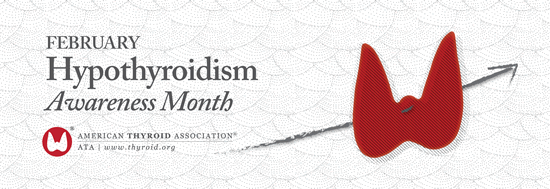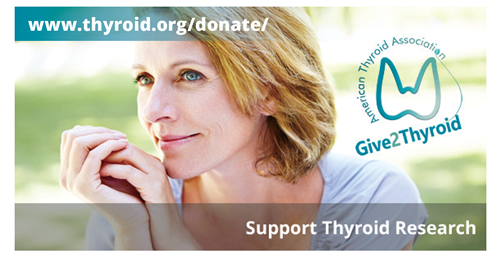Clinical Thyroidology for the Public summarizes selected research studies discussed in the previous month’s issue of Clinical Thyroidology, an official publication of the American Thyroid Association. Editor-in-chief, Alan Farwell, MD, FACE
Volume 12 Issue 2
Available in pdf format for saving and printing and Web page format for viewing online
PDF Format for Saving and Printing
Clinical Thyroidology for the Public Volume 12 Issue 2 (PDF file, 5.69 MB)
TABLE OF CONTENTS – Web Format
HYPOTHYROIDISM Thyroid hormone therapy does not improve symptoms in subclinical hypothyroidism
Whether or not to treat subclinical hypothyroidism is controversial as benefits of treating have not been proven in many cases. One area particularly controversial is with patient symptoms. Multiple studies were done to answer whether treatment would help patients with subclinical hypothyroidism with significant symptoms, with mixed results. The aim of this study was to analyze the results of previously published studies on subclinical hypothyroidism to determine the association of thyroid hormone therapy with quality of life and thyroid related symptoms.
Feller M et al 2018 Association of thyroid hormone therapy with quality of life and thyroid-related symptoms in patients with subclinical hypothyroidism: a systematic review and meta-analysis. JAMA 320:1349–1359. PMID:30285179.
(PDF File for saving and printing, 227 KB)
THYROID AND PREGNANCY Low iodine nutrition in mothers during pregnancy is associated with lower language skills in children up to 18 months of age.
Iodine is an essential nutrient to make thyroid hormone. It is estimated that pregnant women do not get enough iodine intake even in some developed countries. Since enough iodine to make enough thyroid hormone in pregnancy is important for normal baby’s development, this study was done to evaluate whether mother’s iodine status in pregnancy is associated with the baby’s development up to 18 months of age in Norway.
Markhus MW et al. 2018 Maternal Iodine Status is Associated with Offspring Language Skills in Infancy and Toddlerhood. Nutrients. 10(9). pii: E1270. doi: 10.3390/ nu10091270.
(PDF File for saving and printing, 117 KB)
THYROID AND PREGNANCY Maternal hypothyroidism is associated with a higher risk of childhood asthma
When hypothyroidism in pregnancy is not properly treated, there may be complications such as pregnancy loss, premature delivery, and decreased intelligence in the child. It is unclear if there is a link between hypothyroidism during pregnancy and the risk of asthma in children. The goal of this study is to examine whether hypothyroidism during pregnancy affected the risk of developing childhood asthma.
Liu X et al Maternal hypothyroidism in the perinatal period and childhood asthma in the offspring. Allergy 2018; 73:932–939. Epub 2017 Dec 12. PMID: 29159833.
(PDF File for saving and printing, 167 KB)
THYROID CANCER Molecular marker studies in papillary thyroid cancer provide information on cancer prognosis
Recent availability of testing for gene mutations in thyroid biopsy specimens, so-called molecular markers, has provided insight to the prognosis of some thyroid cancers and also to the cause of the cancers. This can allow the identification of cancers that are at high risk vs low risk for spreading outside the thyroid. This study uses molecular markers to determine both prognosis of papillary cancer and the importance of papillary cancer spreading to the lymph nodes of the neck.
Ren H et al 2018 Co-existence of BRAFV600E and TERT promoter mutations in papillary thyroid carcinoma is associated with tumor aggressiveness, but not with lymph node metastasis. Cancer Manag Res. Epub 2018 May 3. PMID: 29760568.
(PDF File for saving and printing, 287 KB)
THYROID CANCER Low dose radioactive iodine is as effective as high dose for low-risk thyroid cancer
Radioactive iodine therapy has been used to treat thyroid cancer for decades. It is unclear whether there are true benefits from radioactive iodine therapy in lower-risk thyroid cancer patients. Additionally, the best dose of radioactive iodine has not been established for low-risk patients that do get that radioactive iodine therapy. This study compared survival and recurrence after low and higher doses of radioactive iodine after thyroid surgery.
Schlumberger M et al 2018 Outcome after ablation in patients with low-risk thyroid cancer (ESTIMABL1): 5-year follow-up results of a randomised, phase 3, equivalence trial. Lancet Diabetes Endocrinol 6:618–626. Epub 2018 May 26. PMID: 29807824.
(PDF File for saving and printing, 287 KB)
THYROID CANCER High-dose radioactive iodine therapy decreases local recurrence for high-risk papillary thyroid cancer
After surgery, patients at intermediate or higher risk of thyroid cancer recurrence are treated with radioactive iodine therapy, which destroys cancer cells. However, this treatment can have side effects and the higher the dose of radioactive iodine used, the more common and severe these side effects will be. This study looked at the effects of high and low doses of radioactive iodine on cancer recurrence and side effects in patient with papillary thyroid cancer.
Gray KD et al 2018 High-dose radioactive iodine therapy is associated with decreased risk of recurrence in high-risk papillary thyroid cancer. Surgery. Epub 2018 Sep 28. PMID: 30274732
(PDF File for saving and printing, 287 KB)





